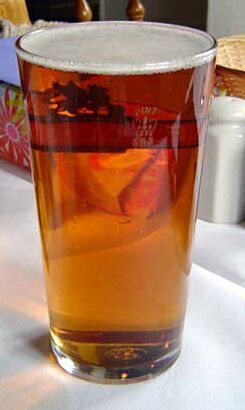More beer anyone?

So did the "alcoholic Big Bang", signal chaos and disorder on the streets? Not really it would seem. Despite the doom laden prophesies from the combined voices of the nanny-statist left, the curtain twitchers of Middle England and a bloodthirsty media baying for vomit, it went off as something of a damp squib.
One police officer in Torbay said they often called their 'extra police officer' "PC Rain" but last night it was "PC Snow" patrolling the streets. Around the country, thanks went to the ice, snow and generally inclement late November weather which were cited as reasons for the disappointing lack of binge-drinking bimbos bilious on the byways of Britain, much to the chagrin of the media.
However Mark Hastings, of the British Beer and Pub Association, dismissed such criticism from those he called "the merchants of doom."
"Anybody would think that the end of civilization is going to be visited upon them at midnight tonight," Hastings said. "But if you treat adults like grown-ups, they act like grown-ups. For too long we've had Nanny bending over us telling us what to do and what not to do."
I know what you’re thinking… Mark Hastings, BBPA head of communications, eh? Well he would say that wouldn’t he?
Well, Hastings is righter than you might think.
It has been argued (in my mind satifactorily) that beer was actually the cause of civilisation. When humans ceased to be nomads and settled down to grow grain and make bread they did this often just so they could use that bread to make beer.
Ancient texts preserved on clay tablets indicate that the earliest beer was Sumerian and made using bread.

Bappir, the Sumerian bread, could be kept for long periods of time without spoiling, and so it was a storable resource. We also know, that bappir was eaten only during food shortages. In essence, making bread was a convenient way to store the raw materials for brewing beer.
But is this a plausible incentive for the domestication of grain? Well yes it is actually.
“Many traditional food preparation practices involve steps that lower the toxicity and improve the nutritional properties of plants. Through fermentation of barley-derived sugars into beer, yeast decreases the levels of tannins, stomach-irritating chemicals, and increases the levels of B vitamins and essential amino acids. Barley has both starch, and, in its sprouted form, enzymes that convert starch to sugar. The seeds can be sprouted any time of year, and the final product has excellent nutritional value and can have mildly intoxicating levels of alcohol.
Collecting and processing wild barley seeds requires tremendous effort, and at the time of the transition to agriculture, barley was not the only exploitable food resource - in fact many others were probably more accessible. It is hard to imagine that the effort spent collecting wild seeds would have been for producing loaves of bread.
The alcohol content and higher nutritional levels of beer, however, might have been incentive enough.”
Solomon H. Katz and Fritz Maytag 1991
While I grant you it would be neatly cyclical for alcohol to herald the end of civilisation as we know it, let it not be forgotten what started this whole civilisation thing in the first place.
More beer anyone?






2 Comments:
Well that's that. Off to the corner store for a couple of bottles of Yebisu. Good reading. Regarding your chav problem, posted on the 8th, I'll just offer three words Moonless night, shovel.
Why bless me Rev? I didn't sneeze.
Maethelwine - just visit your blog - it's great!
Your solution has merit...I will mull it over alongside the chopper idea...
Post a Comment
<< Home